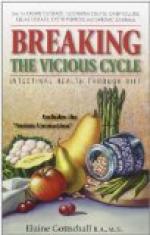CONDIMENTS AND SAUCES
Mayonnaise m. tbsp. 1 100 C. A.h. 200 C. Olive oil and other oils. dsp. 1 100 C. Olives, green or ripe 6-8 100 C. 1 olive 10-15 C. Tomato Catsup 6 oz. 100 C. 1 tbsp. 10 C. Thick Gravies tbsp. 3 100 C.
NUTS
Almonds, large 10 100 C. 1 almond 10 C. Brazil, large 2-1/2 100 C. 1 Brazil nut 45 C. Chestnuts, small 20 100 C. 1 chestnut 5 C. Peanuts, large double 10 100 C. 1 bag 250-300 C. Pecans, large 5 100 C. 1 pecan 20 C. Walnuts, large 3-1/3 100 C. 1 walnut 30 C. Cocoanut, prepared 1/2 oz. 100 C. Peanut Butter 2-1/2 tsp. 100 C.
Key to Key
[Sidenote: Remember This]
If you will remember the following portions of food, you will have a standard by which to compute your servings:
Lean Meat: a piece
3 x 2 x 1/2 (2 oz.) 100 C.
Now if your
serving of meat or fish is fat,
mentally
cut in two for same value. If very
lean, you
should add a little.
White Bread: slice
3 x 4x 1/2 100 C.
Compute
other breads by this.
Butter: 1 scant
tablespoonful 100 C.
Sugar: 1 heaping
teaspoonful 50 C.
Potatoes: 1 medium,
boiled or baked. 100 C.
Watery Vegetables:
1 helping 15-35 C.
If food is fried, or butter, oil, or cream sauces are added, the C. value increases markedly.
Review
1. Why is a mixture of foods necessary?
2. Give the caloric value of the following: 1 glass of milk, skim; buttermilk; 10 chocolate creams; 1 bag peanuts; 1 pat butter; 1 piece pie.
3. Name foods low in caloric value. Why are they valuable?
4. How many calories of bread and butter do you daily consume?
5. Reckon your usual caloric intake. How much of it is in excess of your needs?
6. Memorize caloric value of foods you are fond of.
This Table of Foods, With the C Given Per Oz. Will Help You
The caloric value of pure fat is 255 C per oz., dry starches and sugars (carbohydrates), and protein (the meat element), is 113. This means fats are 2-1/4 times more fattening than other foods. Most foods contain considerable water, so the following is an approximate table of foods ‘as is.’ I have given round numbers in the table so you can more easily remember them. Memorize it.




